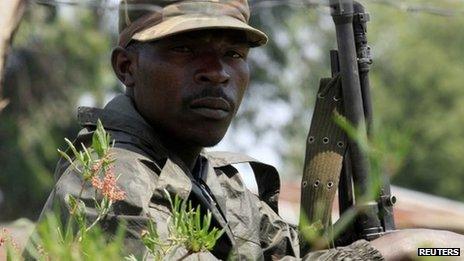DR Congo: M23 rebels threaten to march on Goma
- Published

Mutineer soldiers in eastern Democratic Republic of Congo have threatened to march on the key city of Goma if attacks against civilians in the city do not stop.
One of their leaders said the civilians were being targeted for their alleged allegiance to neighbouring Rwanda.
He denied allegations made by the UN and DR Congo's government that the ethnic Tutsi rebel group was backed by Rwanda.
Kigali also rejects the claim.
Earlier, the UN said peacekeepers were being redeployed to Goma.
The UN's special representative to DR Congo, Roger Meece, said he was determined that the 19,000-strong UN peace force would protect population centres from advancing mutineers.
The rebels - who took up arms in April - named themselves "M23" after a failed peace agreement signed on 23 March three years ago.
They are supporters of renegade General Bosco Ntaganda, who is wanted for war crimes by the International Criminal Court (ICC).
Gen Ntaganda is an ethnic Tutsi - like the majority of Rwanda's leadership - and a recent UN report accused Rwanda of backing the rebels.
'No democracy'
The M23 leadership addressed journalists in Bunagana, a town on the border of Uganda which was captured by the rebels last Friday.
Jean-Marie Runiga Rugerero, who described himself as a bishop, said he was now the leader of the M23's political wing.
He said several other towns that had been seized over the weekend, including the strategic town of Rutshuru, 70km (43 miles) north of Goma, had been handed over to UN peacekeepers.
But he said the rebel withdrawal was dependent on the safety of the civilians.
"Now about Goma, if civilians aren't protected… We M23 will take over the city of Goma and protect the civilians - the Tutsis, the Balega and the Bashi," he said.
He said Congolese civilians were supportive of their cause and were giving them food, and their ammunition came from the captured towns.
"Our intention is to let the international community know that the problems bedevilling this country are not due to interference from neighbouring countries, the problems facing us are caused by ourselves right here in DR Congo," he said.
"There is total disregard and abuse of human rights here in this country. There is no democracy in this country.
"Look at me, I am a bishop. I didn't join M23 because I was jobless. I have a job. Things have to be changed in this country."
A resident of Goma, Paul Gavichi, told the BBC African Service that the Tutsi community was being harassed - he gave examples of Tutsis being forced off buses and attacked, and said there were allegations of rape.
The UN spokesman in Goma, Alexandre Essone, told the BBC's Focus on Africa that the city was quiet and key areas were under the protection of peacekeepers.
He reiterated claims that the M23 had Rwandan backing, saying that their fighters had new uniforms.
An estimated 200,000 people have fled their homes since April, with about 20,000 crossing the border into Uganda and Rwanda.
The BBC's Catherine Byaruhanga on the Ugandan section of the border town of Bunagana says there has been an influx of refugees fleeing the fighting in the last week.
Eastern DR Congo has been plagued by years of fighting.
In 1994, more than a million Rwandan ethnic Hutus crossed the border following the genocide in which some 800,000 people - mostly Tutsis - died.
Rwanda has twice invaded its much larger neighbour, saying it was trying to take action against Hutu rebels based in DR Congo. Uganda also sent troops into DR Congo during the 1997-2003 conflict.